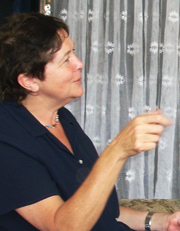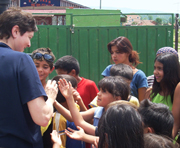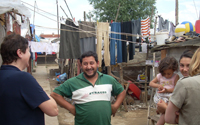HIV-Prevention Education

More Engaged
For more than two decades Jill Lewis, professor of literature and gender studies, has used education as a powerful tool in the international fight against the devastating spread of the HIV epidemic.
Approaching the issue from cultural and gender-focused perspectives, she has developed and implemented HIV-awareness and -prevention initiatives in parts of North America, Europe, Africa, Asia, and the Caribbean.
Young people are the key in this fight, Lewis says: "The epidemic will only be stopped if young people, wave after wave of them, grasp the problem and experience themselves as part of its solution."
 |
Lewis came to Hampshire in 1975 to fill one of the college's first feminist studies faculty positions, while she was completing a doctorate from Cambridge University.
"I was already involved in the women's movement, particularly interested in feminist challenges to sexual politics and reproductive health," she says. "I was interested in exploring the building of bridges between cultural and gender studies, questions of power and agency, and how these played out in social realities of people's lives."
It was an approach that would come in handy later.
In the mid-1980s, Lewis learned that one of her former students had died from AIDS. "Her death was so shocking," Lewis recalls. "All my antennae went out and I thought, 'What is this, that students are at risk of dying before us?' It made me turn toward the epidemic and take stock of the social and sexual realities that underpin its spread." Getting involved just made sense.
"As somebody already skilled at turning research and ideas into dialogues with young people, I felt I could turn to the HIV challenge with a certain kind of energy and certain political and educational insights," Lewis says. Having survived polio as a child, she was drawn to the dynamics of prevention in this new epidemic.
At Hampshire, Lewis focused on AIDS education on campus, in courses and with student groups. Back in Britain, she trained as a volunteer with the first independent regional AIDS center in the United Kingdom. She then went on to become project organizer and facilitator for the National AIDS Trust's Youth Initiative in eight cities in England.
 |
Since 2001, Lewis's HIV-prevention work with the Norwegian Refugee Council has taken her to parts of Georgia and Azerbaijan in the Caucuses, and to Sierra Leone, Liberia, Burundi, the Democratic Republic of Congo, Sudan, Uganda, Somalia, and South Africa, where she runs intensive gender-focused workshops for hundreds of teachers in refugee, youth education programs.
Lewis has taught her Living for Tomorrow course at Hampshire since 2001. Its framework is borrowed from an international HIV-prevention action/research project of the same name that she designed and led with ethnically diverse youth in newly independent Estonia. Exploring the impact of cultural gender norms and expectations on HIV transmission, the project was cited as a best practice initiative by the United Nations Joint Program on HIV/AIDS.
Hampshire students from Lewis's courses have designed and run interactive workshops with youth organizations in a high-HIV-risk community in neighboring Holyoke. Many have also done HIV-related internships during study abroad, and some have continued to work on sexual or reproductive health issues beyond graduation.
 |
Lewis recently completed work with a South African film team as executive producer of a creative documentary filmed in South Africa, Kenya and Sierra Leone - aimed at stirring discussion among man and boys about HIV and condoms.
Funded by the Norwegian Foreign Ministry / Norad and the Norwegian Refugee Council, some 7,000 copies of the DVD have been distributed on request in mostly African countries.
There is more information about Protection: men and condoms in the time of HIV and AIDS at www.protectionthefilm.com.

